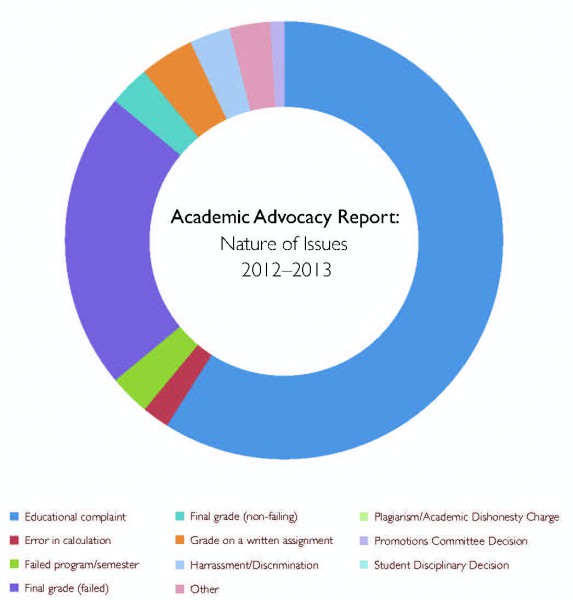 The Academic Advocacy Program (AAP) available through the Student Association (SA) of George Brown College (GBC) released its annual report on all the cases handled by them during 2012 and 2013.More than 400 cases were managed by the AAP last year. Students from health sciences department at GBC registered the most number of cases at 160, followed by art and design, 100, and construction and engineering technologies, 56.A major issue that came out in this year’s report was the number of complaints in the school of dental health (81), especially Denturism (25).
The Academic Advocacy Program (AAP) available through the Student Association (SA) of George Brown College (GBC) released its annual report on all the cases handled by them during 2012 and 2013.More than 400 cases were managed by the AAP last year. Students from health sciences department at GBC registered the most number of cases at 160, followed by art and design, 100, and construction and engineering technologies, 56.A major issue that came out in this year’s report was the number of complaints in the school of dental health (81), especially Denturism (25).
“I was very unimpressed with the education I got at GBC. I have been at the school for four years total and have spent way too much money to have gotten the education I received. It’s absolute robbery,” a soon to graduate Denturism student was quoted in the report. “I will definitely never recommend GBC to anyone.”
According to the report, lack of quality education and the program’s accreditation was brought into question. Mid-way through the year, students were informed that GBC was no longer associated with the Canadian Denturist Association, but sanctioned by the ministry of health and long term care.
This program is set for review during the 2013-14 academic year by the office of academic excellence.
The top two issues of concern were educational complaints dealing with the quality of education in the classroom, faculty not adhering to course outline and; students being dissatisfied with a grade, usually a failing one.
A whopping 61 per cent of the complaints were filed under course management as grounds for appeal, which meant not adhering to the academic code of conduct or from what was described in the course outline. 10 per cent of cases were filed under merit of work.
In their last year’s annual report, 290 cases were filed out of which 127 cases were from the school of practical nursing (PN). There was a decrease in this number in this year’s report as only 33 complaints were logged from the PN program.
So what changed during the year?
Keeping the high number of complaints in the PN program in mind, the SA created a new job description for a health sciences academic advocacy co-ordinator to focus on advocacy efforts and to research what systemic elements might have contributed to that statistics.
Angela Gallant, health sciences academic advocacy co-ordinator conducted a research to study the reason for the significant and similar complaints in the PN program. Through her research she located a phenomenon called horizontal violence pertaining to the nursing profession.
As mentioned in the AAP annual report, “according to Longo (2007), [horizontal violence] it is an act of subtle or overt aggression perpetrated by one colleague toward another colleague, and is the concept underpinning nurses’ description of “eating their young”.”
Colin Druhan, manager of equity and advocacy said, “The SA is looking forward to working with Gary Kapelus and the academic excellence team to reach out to staff, faculty and students to make sure there is broad awareness of the upcoming changes to the college’s academic appeals policy, which was reviewed and updated this year.”
Some of the other areas of concern and recommendations included cross-cultural insensitivity; violations of the code of conduct; and opaque communication.

